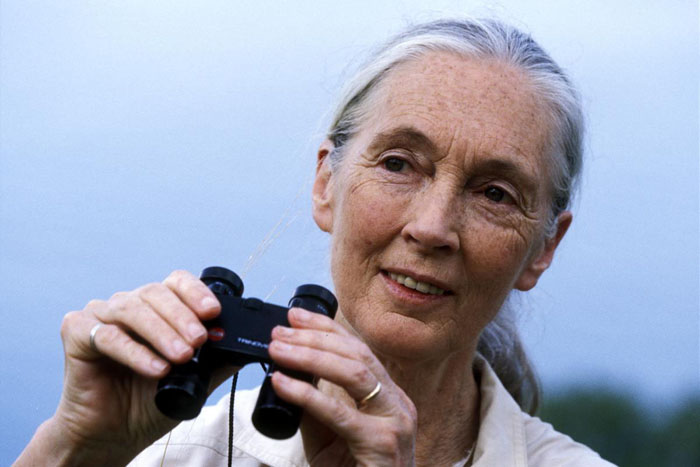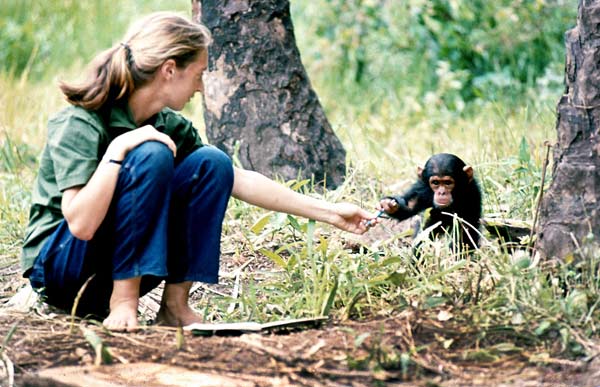Jane Goodall Biography

Jane Goodall is a primatologist most known for her long-term study of wild chimpanzees in Tanzania. The Gombe chimp observation, which Jane began in 1960, is the world’s longest running continuous wildlife research project. Through her Jane Goodall Institute, she has become equally well known as a conservationist and a champion of human rights.
Early life
Valerie Jane Goodall was born on April 3, 1934. Jane showed her love of animals even as a young child; she still treasures the stuffed monkey given to her as a toddler. When she was 4, her parents reported her missing, but she was discovered hours later in the henhouse, where, she explained, she was watching the hens to see how they laid eggs. Her dreams of Africa began with reading the "Doctor Dolittle" books by Hugh Lofting. Jane graduated from the Uplands Private School in 1952 and went to work as a typist. She also worked part time in the film industry, choosing music for documentaries. In 1957, a family friend invited Jane to visit her in Africa.
While she was in Africa, Jane’s friends encouraged her to contact the famous paleontologist, Louis Leakey. Jane was eager to discuss animals with Leakey, who was then curator of the Coryndon Museum in Nairobi. Leakey, who believed that studying other primates would help scientists to understand early hominid societies, saw in Jane someone with the right personality to begin a long term study. He hired her first as a secretary for his dig at Olduvai Gorge. Leakey then asked her to return to England to study primate anatomy and behavior while he raised funds for the proposed field study. On July 14, 1960, Jane Goodall began setting up her camp at Gombe Stream National Park in Tanzania. Leakey later arranged for Jane to earn her Ph.D. in ethology from Cambridge University. She was one of only eight people ever to have a doctoral dissertation accepted by Cambridge without first having an undergraduate degree.
It took two years from her arrival at Gombe for Jane to be completely accepted by the chimpanzee group she set out to study. Jane’s method was to simply observe and imitate the animals, writing down copious notes in a field journal. One of her first discoveries was that chimpanzees are omnivorous, not vegetarian as had been supposed. On several occasions, she observed the chimps hunting and eating small mammals. Two weeks after she first noted them eating meat, Jane saw something else that startled many people — the chimps employed modified twigs to “fish” for termites.

Complex social system
At the time, the use of tools was thought to be the defining characteristic of human beings. Jane’s mentor, Louis Leakey responded to her momentous discovery by saying, “Now we must redefine ‘tool,’ redefine ‘man.’ Or accept chimpanzees as humans.” It was not the last time that Jane’s chimpanzees evidenced startlingly human behaviors. Jane’s work has documented a complex social system, including one “war” between rival groups. She has seen ritualized behavior including use of the social embrace to comfort an animal in mourning. Altruism has been shown by the adoption of orphaned chimps by others in the band. She also argues that the chimpanzees show the beginnings of a primitive language system that includes more than 120 sounds with specific meanings.
In 1971, Jane’s first book, "In the Shadow of Man," became very popular. A small minority of scientists criticized the book for Jane’s habit of naming the animals she observed, but most people considered it a successful balance between scientific documentation and exciting story telling. It introduced the public to the serious scientific work being done. [Video: Jane Goodall's Wild Chimpanzees]
In the 1970s and ‘80s Jane began to spend less time at the Gombe Research Center. She was increasingly alarmed by the changes she was seeing in her beloved Africa. Mining and logging had begun to denude the habitat needed by her chimpanzees; desperately poor people were using slash and burn agriculture to survive. Through her writing and television appearances, Jane became an advocate for conservation, education and human rights. In 1977, she founded the Jane Goodall Institute, a global non-profit organization. The institute is active in promoting health and conservation in the local communities surrounding the chimpanzee habitats. They are active in bringing ecotourism into the area to provide stable jobs; they build medical clinics and dig wells. They teach farmers to use sustainable methods of agriculture by providing nurseries of swift growing trees to be used as fuel and food. The Roots and Shoots division of the institute is a global on-line community of young people and educators.
In April 2002, Jane Goodall was named a United Nations Messenger of Peace by Secretary General Kofi Annan. In 2004, she was invested as a dame of the British Empire by Prince Charles. Today, she continues to travel and lecture throughout the world. As Jane says, “to achieve global peace we must not only stop fighting each other, but also stop destroying the natural world.” On April 3, 2014, Jane will celebrate her 80th birthday. She is still doing her part.
Further reading:
Sign up for the Live Science daily newsletter now
Get the world’s most fascinating discoveries delivered straight to your inbox.










